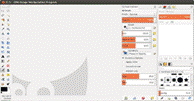SEQUENCES OBTAINED BY REPEATED MULTIPLICATION.

Application software is all the computer software that causes a computer to perform useful tasks (compare with Computer viruses) beyond the running of the computer itself. A specific instance of such software is called a software application, application or app.
The term is used to contrast such software with system software, which manages and integrates a computer's capabilities but does not directly perform tasks that benefit the user. The system software serves the application, which in turn serves the user.
Examples include enterprise software, accounting software, office suites, graphics software and media players. Many application programs deal principally with documents. Applications may be bundled with the computer and its system software or published separately, and can be coded as university projects. Application software applies the power of a particular computing platform or system software to a particular purpose.
Some applications are available in versions for several different platforms; others have narrower requirements and are thus called, for example, a Geography application for Windows or an Android application for education or Linux gaming. Sometimes a new and popular application arises which only runs on one platform, increasing the desirability of that platform. This is called a killer application.
OPERATING SYSTEM

An operating system (also called an OS) is a piece of software that is needed to run the programs on a computer or a mobile device. The programs that run on an operating system talk to the hardware.
An operating system must be made up of different parts: (these can change depending on the operating system)
1. kernel and drivers
2. computer programs and software
A kernel is the central part of an operating system. It manages the tasks of the computer and the hardware - most notably memory and CPU time.
There are two types of kernels:
1. A microkernel, which only contains basic functionality;
2. A monolithic kernel, which contains many drivers.
A computer user never interacts directly with the kernel. It runs behind the scenes and cannot be seen, except for the text logs that it prints.
Tasks commonly done by operating systems:
1) Interaction with the user, and management of attached devices (such as USB flash drives)
2) Management of programs (things like starting and stopping them)
3) Management of resources like processor time: Making sure each program gets a fair amount of power.
4) The reading and writing of data
5) Memory management: virtual memory, paging or swapping
Examples of popular modern operating systems include Android, BSD, iOS, Linux, Mac OS X, QNX, Microsoft Windows, Windows Phone, and IBM z/OS. All these, except Windows and z/OS, share roots in UNIX.
Дата добавления: 2015-12-01; просмотров: 1203;
